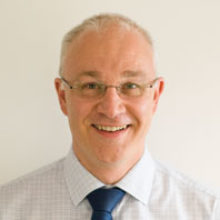From the Chief Executive
Issue: Metabolism, Health and Disease
07 May 2019 article

In the past few months, two events have very powerfully shown the value of a membership charity like the Microbiology Society in supporting members. Back in March, our new President, Judith Armitage, began her members’ Roadshow by visiting Leeds and Newcastle, where we met a large number of members to learn more about how the Society can support your career progression. Then, last month the Annual Conference was a festival of microbiology and friendship where over 1,300 researchers came together to share results, make new connections and renew existing ones.
At the Roadshow events, Judy described her own career path, and the thing that clearly struck a chord with many early career members was that Judy’s success has not always been plain sailing. Everyone faces significant challenges in a research career. Judy’s advice was clear – find a scientific question that fascinates you and keep working at it even if it’s not fashionable, and build a strong support network of collaborators.
Of course, one of the most effective ways of doing this is to attend the Society’s Annual Conference, and this year’s event in Belfast was a brilliant example. As we do every year, we brought together scientists interested in microbes, their effects and their practical uses, and created as many opportunities as we could to get you talking to one another about your science, the challenges you face and your careers.
If it’s possible, next year’s Annual Conference is going to be even better. 2020 will be the 75th anniversary of the Microbiology Society, and one of the ways we will celebrate is by adding an extra day to the Conference, organised by former winners of the Fleming Prize Lecture. The programme will include two keynote lectures – one from Bonnie Bassler, famous for her pivotal role in the discovery of quorum sensing in bacteria, and one from Nobel Laureate Paul Nurse, who won the Fleming Prize in 1984. There will be inspiring talks, ranging from ‘The expanding virosphere’ by Eddie Holmes, one of the world’s leading experts on virus evolution, through to Mark Pallen of the Quadram Institute, talking about ‘What ancient DNA can tell us about pathogens from the past’.
But as well as established experts, there will be a platform for early career microbiologists, including a number of ‘Five-Minute Theses’, where PhD students will present their results to the Society’s membership. We will learn more about the career paths of some of the Fleming Prize winners, where the winners will outline what went well and what challenges they met along the way. Many of the Fleming Prize winners already have the date of next year’s anniversary Annual Conference in their diaries, 30 March to 3 April 2020 in Edinburgh, and I can’t wait to see so much microbiological talent in the same room and at the same time.
In the meantime, this year has an exceptional series of Focused Meetings, starting with Anaerobe 2019 in Cardiff in June, organised by Sheila Patrick and colleagues, which will look at changing perceptions of anaerobic bacteria. Later the same month, Janet Quinn and colleagues are organising the British Yeast Group meeting in Newcastle, which will look at the journey from discovery to the impact of research. The International Meeting on Arboviruses and their Vectors, being held in Glasgow in September, is now an established and unmissable meeting that Alain Kohl regularly organises with colleagues.
October will see a special meeting in Dublin organised by Joan Geoghegan and Charles Dorman. The Irish Division will celebrate a century of microbiology at Trinity College Dublin with a meeting on Microbes in Medicine. Charles is Professor of Microbiology at Trinity; he is also a member of Council and he won the Fleming Prize Lecture in 1994, underlying the long-established links between the Society and microbiology in Ireland. The last Focused Meeting of the year will be in Oxford at the end of October, where Freya Harrison and colleagues will focus on antimicrobial drug discovery from traditional and historic medicine. Finally, in November, we are delighted to host the Federation of Infection Societies (FIS) Annual Conference in Edinburgh.
There is something for everyone in the programme and I hope to see you at one of the meetings.
Peter Cotgreave
Chief Executive
[email protected]
